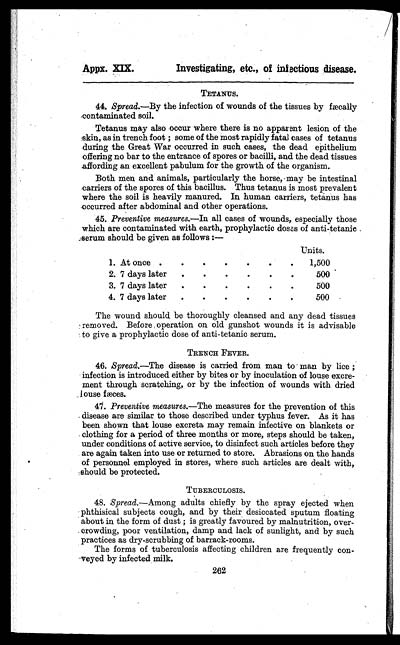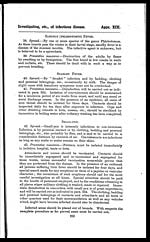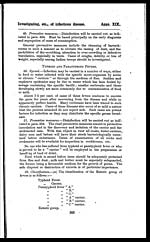Medicine - Institutions > Army health reports and medical documents > Army regulations, India > Regulations for the medical services of the Army of India 1930 > Appendix XIX
(278) Page 262
Download files
Individual page:
Thumbnail gallery: Grid view | List view

Appx. XIX.
Investigating, etc., of infectious disease.
TETANUS.
44. Spread.— By the infection of wounds of the tissues by fæcally
contaminated soil.
Tetanus may also occur where there is no apparent lesion of the
skin, as in trench foot; some of the most rapidly fatal cases of tetanus
during the Great War occurred in such cases, the dead epithelium
offering no bar to the entrance of spores or bacilli, and the dead tissues
affording an excellent pabulum for the growth of the organism.
Both men and animals, particularly the horse, may be intestinal
carriers of the spores of this bacillus. Thus tetanus is most prevalent
where the soil is heavily manured. In human carriers, tetanus has
occurred after abdominal and other operations.
45. Preventive measures.— In all cases of wounds, especially those
which are contaminated with earth, prophylactic doses of anti-tetanic
serum should be given as follows:—
| Units. | |
| 1. At once | 1,500 |
| 2. 7 days later | 500 |
| 3. 7 days later | 500 |
| 4. 7 days later | 500 |
The wound should be thoroughly cleansed and any dead tissues
removed. Before operation on old gunshot wounds it is advisable
to give a prophylactic dose of anti-tetanic serum.
TRENCH FEVER.
46. Spread .—The disease is carried from man to man by lice;
infection is introduced either by bites or by inoculation of louse excre-
ment through scratching, or by the infection of wounds with dried
louse fæces.
47. Preventive measures .—The measures for the prevention of this
disease are similar to those described under typhus fever. As it has
been shown that louse excreta may remain infective on blankets or
clothing for a period of three months or more, steps should be taken,
under conditions of active service, to disinfect such articles before they
are again taken into use or returned to store. Abrasions on the hands
of personnel employed in stores, where such articles are dealt with,
should be protected.
TUBERCULOSIS.
48. Spread .—Among adults chiefly by the spray ejected when
phthisical subjects cough, and by their desiccated sputum floating
about in the form of dust; is greatly favoured by malnutrition, over-
crowding, poor ventilation, damp and lack of sunlight, and by such
practices as dry-scrubbing of barrack-rooms.
The forms of tuberculosis affecting children are frequently con-
veyed by infected milk.
262
Set display mode to: Large image | Zoom image | Transcription
Images and transcriptions on this page, including medium image downloads, may be used under the Creative Commons Attribution 4.0 International Licence unless otherwise stated. ![]()
| Permanent URL | https://digital.nls.uk/74907271 |
|---|
| Description | Notes on investigating, reporting on, and dealing with outbreaks of infectious disease |
|---|---|
| Shelfmark | IP/FA.43 |
|---|---|
| Additional NLS resources: | |
| Description | Contains orders of the Government of India on military medical and sanitary matters. Covers Military Medical Service duties and military hospitals (including diet and equipment), dental treatment. Management of infectious diseases (treatment and vaccinations, disinfecting procedures) shown. Includes troop movements. |
|---|---|
| Shelfmark | IP/FA.43 |




